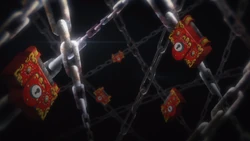
A red Psyche-Lock.
A Psyche-Lock is a mental barrier that an individual possesses, which protects their secrets from others. Phoenix Wright's magatama allows its holder to see these barriers manifest as chains surrounding an individual, sealed by red or black locks. Wright is generally the one to use the magatama, which he uses to gather additional info during an investigation, though Miles Edgeworth borrowed it once when he temporarily took Wright's place as Iris's defense attorney. As part of the spirit medium training at Hazakura Temple, the nuns use physical trick locks, which greatly resemble Psyche-Locks, to seal spirit mediums in training rooms to ensure isolation.
Red Psyche-Locks[]
- Main article: Magatama
| Pearl Fey |
| The more someone wants to hide their secret, the more locks you will see. If it's only one, I think you can easily unlock it. |

One Psyche-Lock, the minimum number that can appear.

Five Psyche-Locks, the most that can appear at once.
Red Psyche-Locks represent a secret that an individual is consciously trying to hide. The number of locks represents his or her determination to hide the secret, and this number can vary from one to five. This in turn allows the magatama to be used as a sort of lie detector, largely removing the possibilities of interrogating individuals about knowledge they do not have or being misled with red herrings. However, it is still possible to be misled if someone is technically telling the truth but is hiding something that Wright failed to account for in his initial questioning.
Red Psyche-Locks can be broken by correctly identifying a clue that is related to the secret, though occasionally other methods such as bribery can accomplish this as well. This usually involves presenting evidence or a profile from the court record. The effectiveness of such an action on Psyche-Locks varies; it may take two clues to break a single lock, or a single clue may break four. When the locks break, they shatter with a sound akin to a glass window breaking. Breaking a Psyche-Lock lets Wright know that he is on the right track to uncovering the secret. Breaking all Psyche-Locks tends to leave the target in a mood in which they are more willing to divulge more details, generally because Wright has figured out the most critical portions of the secret.
If a mistake is made by presenting the wrong evidence, then the magatama's holder may lose spiritual strength. This was a real and present threat for Wright prior to the end of his disbarment period. Physically, however, although Wright might have exclaimed "ouch" or something along those lines, he did not seem too bothered by it. If too many mistakes were made, Pearl Fey's voice would intervene with a warning that, if he pushed himself further, his soul would shatter. Wright would then have to start from the beginning if he wished to try again, and even then, he only had one chance before he had to restart. Fortunately for Wright, however, the fatal threat to his soul never actually came to pass, and he could make as many attempts on Psyche-Locks as he liked. Luckily, when all the locks on an individual were removed, Wright's spiritual strength was restored by half. These dangers to Wright's soul seem to have been rendered irrelevant ever since Pearl Fey recharged his magatama in 2027.
It is possible to stop the process, though if Wright does so, the next attempt has to start again from the beginning, with any locks that were broken completely restored. In Wright's early career, he would usually run into Psyche-Locks and not possess the information necessary to break them until later in his investigation. This would usually happen due to evidence that had not yet been found, but occasionally Wright would lack requisite information on an individual to attack a Psyche-Lock with said individual's profile successfully. In a rare case in 2019, Wright possessed the MC Bomber disc but had to learn that it was a computer virus before using it successfully against Lisa Basil. In another case that same year, Edgeworth needed to prove where Larry Butz was at the time of the incident, but could not do so until Heavenly Hall had been added to the map.
Iris, Larry Butz, and Herman Crab have all showed five red Psyche-Locks which were broken in an unconventional manner. However, Iris eventually revealed her secret on her own, while Larry Butz and Herman Crab's secrets were eventually revealed in court.
Black Psyche-Locks[]
| Phoenix Wright |
| (Wh-Whoa! I've never seen Psyche-Locks like these! Dark... Cold... Full of despair... Can I even unlock these things?) |

Kristoph Gavin's black Psyche-Locks.
Black Psyche-Locks represent a secret that an individual keeps subconsciously, without even being aware of it. Forceful attempts to remove them by presenting evidence can cause permanent emotional and spiritual damage. Wright has described black Psyche-Locks as dark, cold, and full of despair. The two people Wright has met who manifested black Psyche-Locks presented two very different situations surrounding them.
In Kristoph Gavin's case, the sheer paranoia he showed in hiding his schemes from others caused him to outright ignore Wright's questioning entirely when asked about his motive for murdering Zak Gramarye. Even when Apollo Justice and Klavier Gavin later found out about Kristoph's spying activities, which had led to the murders of Gramarye and Drew Misham, Kristoph dismissed it all as "quite an entertaining piece of fiction" since they had no evidence to prove it.

Athena Cykes' black Psyche-Locks.
On the other hand, Athena Cykes's black Psyche-Locks stemmed from a traumatic event involving the death of her mother, Metis Cykes. Wright broke these locks without unintentionally hurting her by rethinking the entire case and realizing that a mysterious intruder wearing a mask had killed Metis. This caused Athena's memories of the event to return.
Gameplay[]
- See also: Magatama
The magatama and Psyche-Locks are introduced in Phoenix Wright: Ace Attorney - Justice for All and are used in every subsequent game in the main series. They appear primarily in investigations while talking to a character. Usually, when a topic button in the "Talk" menu is selected, the protagonist and the character in question discuss the topic in a scripted event, and once this concludes, a check mark appears over the topic button indicating that it has been used. However, when the character in question is unwilling to divulge certain details, Psyche-Locks appear and a Psyche-Lock icon rather than a check mark appears over the topic button. This indicates that the protagonist must use the magatama, which starts a sort of interrogation. In Justice for All and Phoenix Wright: Ace Attorney - Trials and Tribulations, this is done by selecting the "Present" command and presenting the Magatama from there. From Apollo Justice: Ace Attorney onward, a Magatama icon appears on the "Talk" menu that is used by touching it or pressing the "X" button in the same way Apollo Justice's bracelet is used.
Because Psyche-Locks are used in specific scripted events for gameplay purposes, their appearances can be inconsistent; for example, a character may be hiding something directly related to an inquiry, but Psyche-Locks may not appear, leaving the secrets to be discovered in the trial segments rather than out-of-court.
Differences across games[]
- See also: Penalty
In Justice for All, breaking Psyche-Locks is the only way to replenish the "Confidence Gauge" used as part of the penalty system in a given episode. This means that penalties incurred while breaking Psyche-Locks impact the leeway given in trial segments, and penalties incurred in the courtroom impact the leeway given in Psyche-Lock breaking. Consequently, brute-force guessing is punished throughout an episode, so even if failure to break Psyche-Locks does not directly result in a game over, it is inadvisable to do so unless the player does not mind resetting many times or even starting from the beginning. The player should instead make sure that all possible evidence has been gathered.

A Psyche-Lock being broken.
In Phoenix Wright: Ace Attorney - Trials and Tribulations and Apollo Justice: Ace Attorney, the "Confidence Gauge" is replenished at the end of every investigation and trial segment, separating "spirit health" from courtroom penalties. Penalties were removed entirely from investigations as of Phoenix Wright: Ace Attorney - Dual Destinies, removing the "spirit health" notion from the Psyche-Lock breaking process altogether. This change coincides with (and may be a result of) the Magatama being recharged in Turnabout Reclaimed.
Psyche-Lock data[]
The following is a list of Psyche-Locks in the Ace Attorney series.
Phoenix Wright: Ace Attorney - Justice for All[]
Phoenix Wright: Ace Attorney - Trials and Tribulations[]
| Episode | Character | Number | Topic | Evidence presented |
|---|---|---|---|---|
| The Stolen Turnabout | Luke Atmey | 1 | Mask☆DeMasque's M.O. | Camera Data and Shichishito |
| Larry Butz | 2 | The Night of the Crime | CEO Office Key Card twice, or Ron's Wallet and CEO Office Key Card. | |
| Adrian Andrews | 2 | The Sacred Urn | Sacred Urn, Treasure Exhibit Poster, Paint Marks, and Urn Box | |
| Recipe for Turnabout | Old man | 3 | Trés Bien Regular | Lunch Special, Job Listing, Sports Paper, and Maggey Byrde's profile |
| Jean Armstrong | 3 | Maggey's Motive | Jean Armstrong's profile, Victor's Note, Magatama, and Jean's Loan Contract | |
| Dick Gumshoe | 1 | The Radio | Victim's Lottery Ticket | |
| Lisa Basil | 3 | Glen's Trouble | Victim's Lottery Ticket, Losing Horse Racing Tickets, Furio Tigre's profile, Glen's Calendar, and MC Bomber* | |
| Viola Cadaverini | 4 | The Head Bandage | Repair Bill, Bruto Cadaverini and Furio Tigre's profiles, Scooter and Bruto Cadaverini's profile again. Optional: Viola Cadaverini's profile | |
| Bridge to the Turnabout | Iris | 5 | How she knows Wright | Unbreakable* |
| 2 | I Was Frightened | Note to Iris and Phoenix Wright's profile | ||
| 5 | Why go to Dusky Bridge? | Unbreakable* | ||
| Larry Butz | 3 | The Night of the Crime | Hazakura Temple Map*, Iris's profile, and Note to Iris | |
| 5 | Something incredible | None; secret is revealed during the first trial, after refuting his testimonies in court until he confesses about how he saw "Iris flying". | ||
| Bikini | 5 | Elise Deauxnim | Kurain Master's Talisman and Hanging Scroll | |
| Dahlia Hawthorne* | 3 | The Night of the Crime | Bikini's profile, either Iris's Testimony or Iris's Hood, and Dahlia Hawthorne's profile* | |
| Pearl Fey | 5 | The Night of the Crime | Maya Fey, Dahlia Hawthorne* and Morgan Fey's profiles, Burnt Letter, and Hanging Scroll |
Apollo Justice: Ace Attorney[]
| Episode | Character | Number | Topic | Evidence presented |
|---|---|---|---|---|
| Turnabout Succession | Mike Meekins | 2 | The Disappearing Trick | Trucy Enigmar's profile and The Amazing Mr. Hat |
| Drew Misham | 2 | You're Hiding Something | Vera Misham's profile | |
| Vera Misham | 2 | The Client | Nail Polish and Kristoph Gavin's profile | |
| Valant Gramarye | 4* | The Trick Up His Sleeve | Stage Pistol, Trucy's Locket, Commemorative Stamp, and Thalassa Gramarye's profile* | |
| 2* | Magnifi's Death | Transferal of Rights and Zak's Confession | ||
| Zak Gramarye | 3 | The Gramarye Secret | Either Stage Pistol or Commemorative Stamp, Apollo Justice's profile, and Thalassa's Portrait. | |
| Kristoph Gavin | 5 (Black) | Reason for murder | Unbreakable* |
Phoenix Wright: Ace Attorney - Dual Destinies[]
| Episode | Character | Number | Topic | Evidence presented |
|---|---|---|---|---|
| Turnabout Reclaimed | Pearl Fey | 1 | Relation to Rimes | Rifle's profile and Calendar |
| Norma DePlume | 2 | Why You're Here | Magatama (recharged) and Security Footage | |
| Herman Crab | 2 | The Monitoring System | Security Footage and Security Card | |
| 5 | Shipshape Aquarium's Secret | Unbreakable* | ||
| The Cosmic Turnabout | Bobby Fulbright | 2 | Why You're Being Cooperative | Evacuation Report and Candice Arme's profile |
| Turnabout for Tomorrow | Yuri Cosmos | 3 | Behind the Switching of the Launch Pads | Clay Terran and Simon Blackquill's profiles |
| Athena Cykes | 5 (Black) | Did I kill my mother? | Unbreakable* |
Phoenix Wright: Ace Attorney - Spirit of Justice[]
| Episode | Character | Number | Topic | Evidence presented |
|---|---|---|---|---|
| The Rite of Turnabout | Beh'leeb Inmee | 3 | The High Priest | Lady Kee'ra's Warning, Envelope, and Warbaa'd Arrow |
| Datz Are'bal | 4 | Datz's Plan | Nahmanda Flower, Brand New Flag, Dhurke's Law Book, and Attorney's badge | |
| Turnabout Time Traveler | Larry Butz | 2 | What Larry Is Hiding | Ellen Wyatt's profile and Business Card Wallet |
| Pierce Nichody | 3 | Pierce's Secret | Sorin Sprocket's profile, Newspaper Article, and Lift Bloodstain |
Anime[]

Five Psyche-Locks, as depicted in the anime.
While Phoenix Wright does not receive the magatama like in the games, five Psyche-Locks are symbolically depicted breaking when Matt Engarde reveals his true persona to Wright in "Farewell, My Turnabout - 2nd Trial". However, these appear to be non-diegetic, as they are not addressed by Wright or anyone else.
Trick locks make their debut in "Bridge to the Turnabout - 1st Trial", blocking the entrance to the Training Hall in Hazakura Temple and overall serving the same role as their game counterpart.
Some stats[]
- Bridge to the Turnabout has the most Psyche-Locks and Psyche-Lock sets of any episode, with a total of 33 locks distributed among 8 sets, including those that are not broken during the game.
- Iris and Larry Butz are the characters with the most cumulative Psyche-Locks, each with a total of 12 during the time they are interrogated.
- The Cosmic Turnabout has the fewest, with only 1 set of 2 Psyche-Locks.
- Pearl Fey and Larry Butz both have three instances of breakable Psyche-Locks throughout the series, the most of any character.
- Spirit of Justice is the only game in the series not to feature five red or black Psyche-Locks at once for a character.
Music[]
There are three pieces of background music used when an attempt is made to break Psyche-Locks. The first is simply titled "Psyche-Lock" and is used in Phoenix Wright: Ace Attorney - Justice for All and Phoenix Wright: Ace Attorney - Trials and Tribulations. The second is "Psyche-Lock 2007", a slightly more intricate version used in Apollo Justice: Ace Attorney. The third is "Psyche-Lock 2013", used in Phoenix Wright: Ace Attorney - Dual Destinies and Phoenix Wright: Ace Attorney - Spirit of Justice.
The Psyche-Lock theme is featured on the Gyakuten Saiban Meets Orchestra album as the opening section of a Fey clan-themed medley called "Those of Fey Blood" (consisting of the Psyche-Lock theme, "Dahlia Hawthorne ~ Distant Image", "Elise Deauxnim ~ Gentle Melody", and "Turnabout Sisters Theme").
Localization[]
In the Japanese versions of the games, the Psyche-Locks are called Saiko rokku (サイコ・ロック(心理錠), "Psycho Locks"), while Miles Edgeworth mistakenly calls them Saikoro-jō (さいころ錠, "Dice Locks"). In the English localization, Edgeworth and Drew Misham refer to them as "psycholocks" and "psycho locks", respectively, a possible reference to their original name. This joke continues any time others hear about the Psyche-Locks in the English version.
In the Spanish localization, they are called "Psico-Candados" (literal equivalent of "Psyche-Locks"), while Edgeworth calls them "Loco-candados" (Psycho[path] Lock) instead. Unlike the English version, Drew Misham does not get the name wrong in the Spanish localization.
In other media[]
- In the manga "Professor Layton and the Cheerful Mystery Volume 1", which is based upon the Professor Layton video game series, Luke Triton uses what appear to be Psyche-Locks to lock his door.
- In the anime series Sayonara, Zetsubou-Sensei, Psyche-Locks make a brief cameo appearance when protagonist Nozomu Itoshiki attempts to lie about never being abroad.
- Psyche-Locks appear in "The Age of Pop Team Epic", the last episode of the Pop Team Epic anime series. More specifically, they are shown to be sealing the inside of a castle gate.
